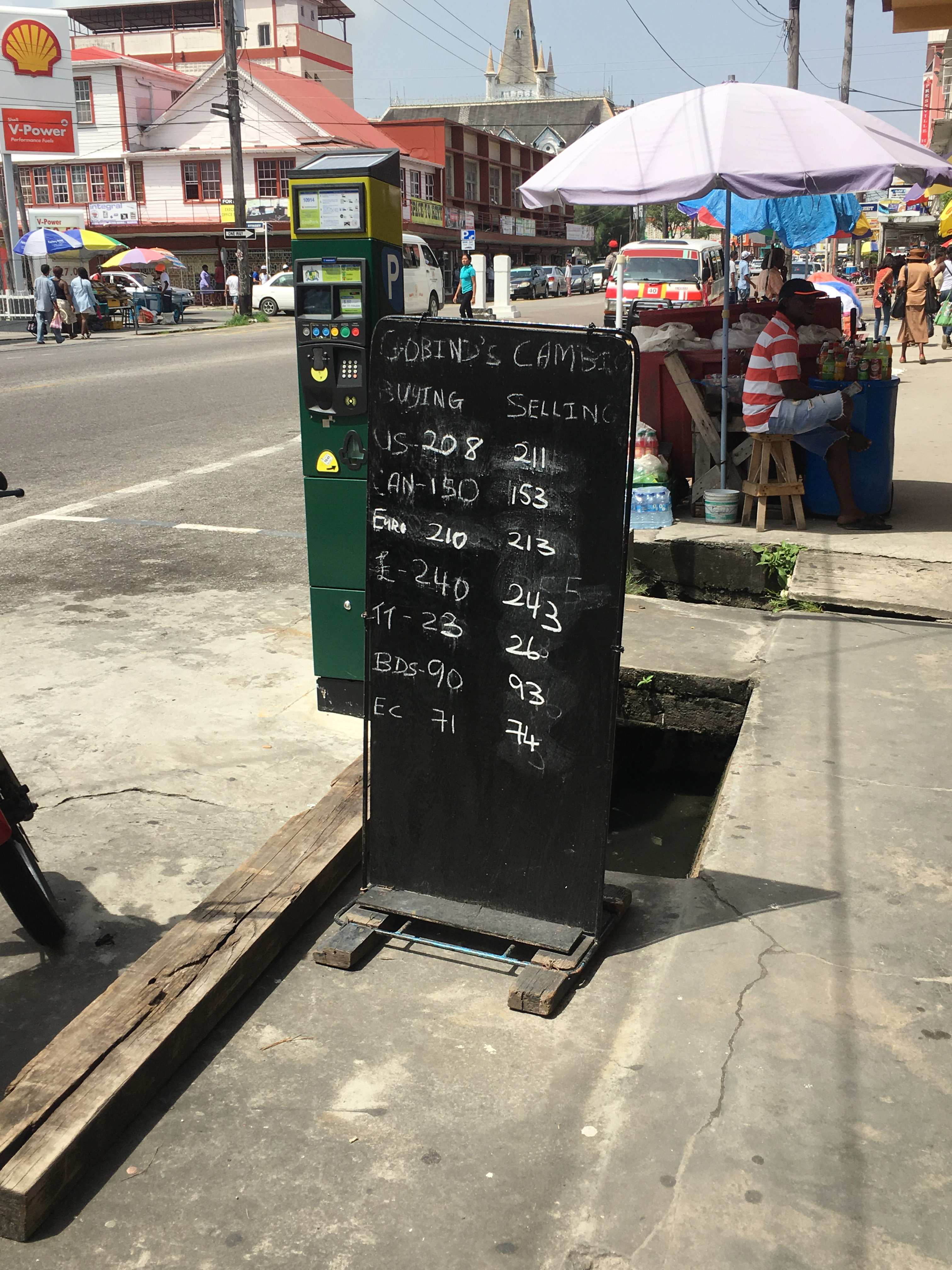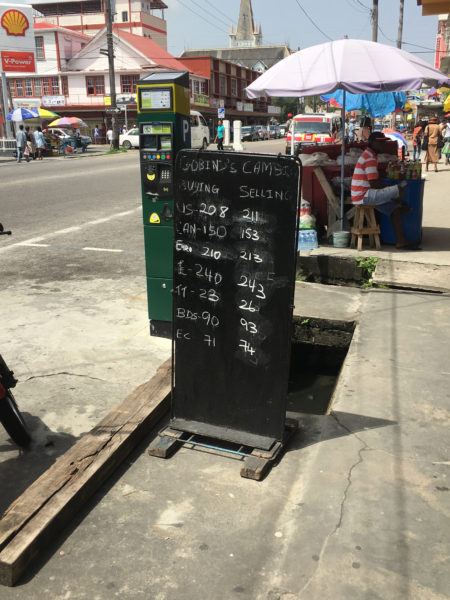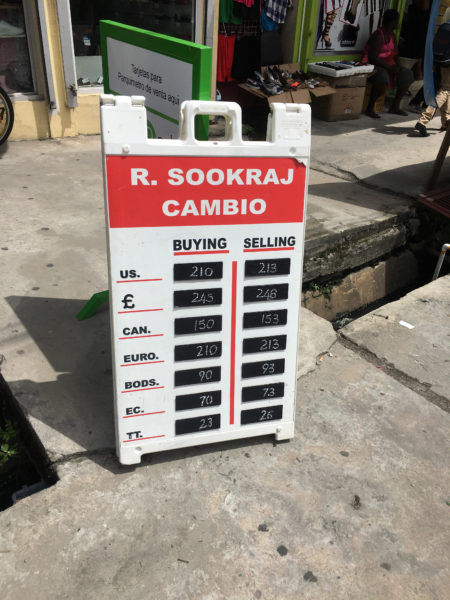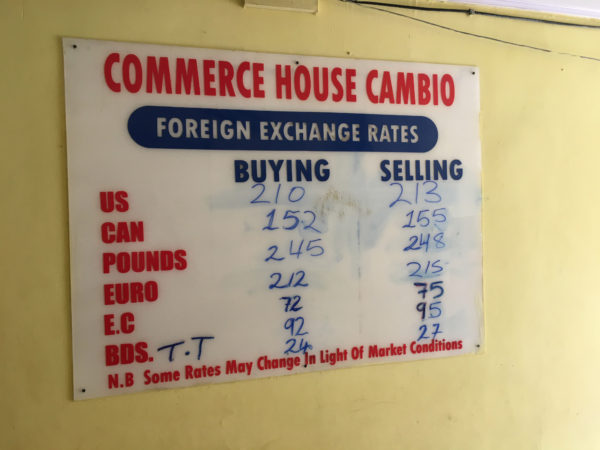Circulars from the Bank of Guyana (BOG) on February 2 to currency traders have fixed the spread between the buying and selling rates to no more than $3 and setting other stipulations which observers say constitute the biggest rollback in the free trade of foreign exchange for decades.
The three circulars issued to bank cambios, non-bank cambios and money transfer agencies likely signal concern over weeks of stress on the foreign currency market with businesspersons and citizens complaining that their applications for money have been met with delays and placement on waiting lists.
Concerns will mount that the distensions in the market may signal a lack of confidence in the economy and incidents of capital flight.
Each of the circulars say that the Bank of Guyana is taking steps to “improve the efficiency, depth and liquidity of the foreign exchange market and in accordance with section 7 of the Dealers in Foreign Currency (Licensing Act) 1989”.
The circular to commercial banks on the operation of bank cambios stated that they must reduce the spread between the buying and selling rates “to no more than G$3, and no more than G$1.50 in wire transfers”.
Further, the circular said that sales of foreign currency to large importers by commercial bank cambios should only be countenanced upon the presentation of a valid import invoice.
The circular added that credit cards issued by commercial banks are only to be used for the purchase of goods and services for non-commercial purposes and not business activities.
The circular to non-bank cambios stated that they must also reduce the spread between the buying and selling rates to no more than $3 and that the selling rate of all foreign currencies must reflect the board rates displayed by the cambio.
In their circular, money transfer agencies were told that they “shall sell their monthly net inflows to licensed bank cambios with a maximum of 25 percent of such inflows being sold to any one of such cambios”.
All daily sales must also be reported to the Bank of Guyana.
Up to press time yesterday there was no response from the bankers association or the private sector to the circulars.
Regulation of the market had been adverted to on the same day the circulars were issued by Minister of State Joseph Harmon. This had triggered a response on the same day by the Private Sector Commission warning against any such action.
Decline
Yesterday, several non-bank cambio owners around the city were of the opinion that the move by the BOG is flawed and will only result in a decline in the foreign currency business.
“This is wrong, you can’t control this thing. This [foreign currency market] is based on a supply and demand system just like every other goods. It was always based on a free market and if they are trying to control the price then this is not the way to do it,” one of the owners of a cambio, who did not want to be named, related to Stabroek News yesterday.
He explained that because the foreign currency prices fluctuate based on the world market, it is bad business to impose such a restriction. He explained that if today he bought a specific currency at $210 and, as a result of the stipulation, he has to sell at $213 but the market price suddenly falls to $200 then he will automatically be making a loss.
“But what are we going to do? If someone comes in the cambio and they have US$50,000 and they are telling me that they getting (better rates) on the street, because they do that, they tell you what they would get on the street, would I allow him to go away? You can’t allow that,” he contended.
The cambio dealers argued that the new structure will force persons to find other sources for purchasing their currencies. “It is going to force more people to do underground business. Those people on America Street (unlicenced currency traders) are going to carry away the business,” he said, while pointing out that most of the unregulated currency dealers sell at a better price than the cambios since they have no restrictions when it comes to the law. “Nothing is being enforced with them so people just pull up and exchange the money quickly,” he said.
Another cambio owner argued that the currency market is just as any other goods market. “Just like a store selling goods, you can’t tell the store how much to sell the product for. You can’t look at how much they paid for it and then say that they can only sell it back for a specific amount, it doesn’t make any sense,” the man said.
He further stated that the supply and demand drastically affects the price at which currencies are bought and sold for. He said that whenever there is a surplus of currency and the demand is down, the cambios voluntarily drop their prices without any intervention from the BOG.
Another dealer explained that in addition to the new spread restrictions, the implementation of parking meters around the Central Business District has caused a slowdown in persons doing business with cambios.
“At least for me, I have seen a slowdown. Persons don’t want to stop, pay for parking and then come in here to change money when they can just drive up America Street, or around that area, and transact their business right from their cars,” he explained.
However, while the cambio dealers are against the decision by the BOG, they related that they have no other choice but to comply with the regulation.
Stabroek News also spoke to a few of the money changers on America Street, who related that they were unaware of the new regulations that the BOG is placing on cambio dealers. “I didn’t hear anything about it and I don’t think it’s really going to affect them much. People don’t come to us with big money, it’s the small man that wants a quick change that we get business from. People with a lot of money prefer to go to the cambios where there is security,” one of them related, while pointing out that while the market has slowed down, he has not noticed any difference in the availability of foreign currency.
When Stabroek News visited several cambios around Georgetown, their prices were updated with the $3 spread.
Stabroek News also visited Republic Bank where it was noted that they were buying US dollars at $207 and selling at $210. Scotiabank was listed as buying at $199 and selling at $210 and GBTI was seen as buying at $202 and selling at $208.











